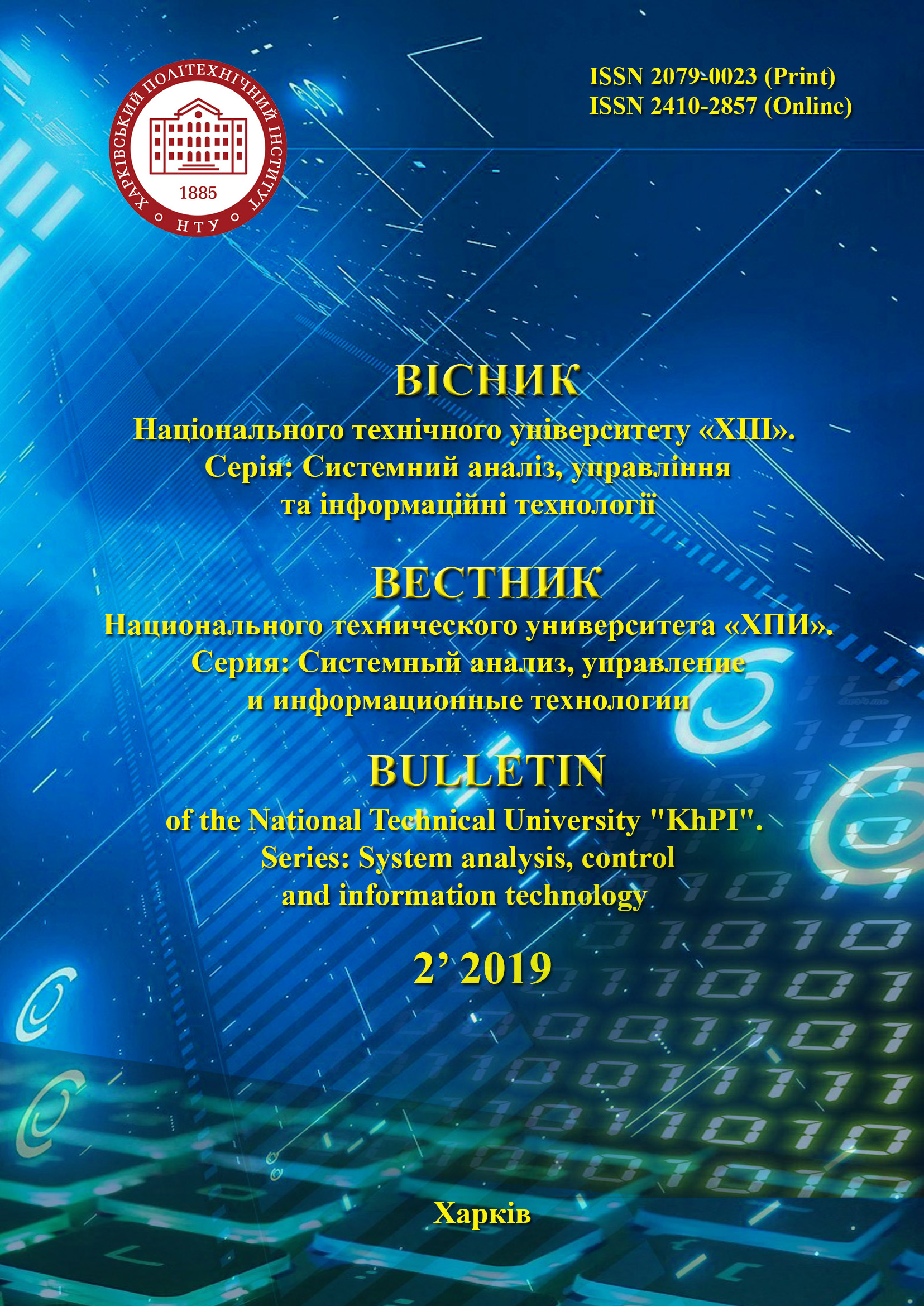ASSESSMENT OF THE COMPLEX SYSTEM CONDITION (ON THE EXAMPLE OF AN IT COMPANY)
DOI:
https://doi.org/10.20998/2079-0023.2019.02.01Keywords:
complex system management, condition assessment, fuzzy cluster analysis, situational approach, reference situations, informational granuleAbstract
The paper considers the problem of estimating the state of the enterprise (on example of the IT company). The problem is presented in the form of two problems. The first problem is the aggregation of the initial information and the second problem is the identification of the state of a complex system. Authors formulated the problem and selected methods for solution of the problem. It is possible to form software for solving research problems. To solve the problem of aggregation of initial data authors used the fuzzy cluster analysis, namely the fuzzy k-means method. A numerical research was carried out and a test case was figured out in the MATLAB environment. In this test case the source data was reduced to a dimensionless form. Thereafter, already reduced to the same scale, the initial attributes were reduced to fuzziness. The results allow to formalize linguistic variables, which are characterized by the term-sets and definition range. The numerical results were approximated by analytical membership functions. The solution of the first task allows to generate a set of possible fuzzy reference situations, which reflect the possible state of the system. Each situation is characterized by the reference informational granule, which contains information about formalized linguistic variables. The second problem was solved by using the method of fuzzy logic in the MATLAB environment. The test case was calculated. In this test case, the search of the situation in which the IT-company is located was performed. At this stage, the current situation belongs to comparison with each reference situation. In this way, authors determined the most similar reference situation to the current situation. An analysis of the resulting situation allows to argue the state of the IT company. The solution of the second task allowed to establish assessment of IT company state. The theoretical and practical results can improve the efficiency of complex system management.References
Borisov A. I., Alekseev A. V., Krumberg O. A. Modeli prinyatiya reshenij na osnove lingvisticheskoj peremennoj [Decision models based on a linguistic variable]. Riga, Nauka Publ., 1982. 256 p.
Melixov A. N., Bershtejn L. S., Korovin S. Y. Situacionnye sovetuyushhie sistemy s nechetkoj logikoj [Situational advisory systems with fuzzy logic]. Moscow, Fizmatlit Publ., 1990. 312 p.
Melixov A. N., Bershtejn L. S. Ekspertnaya diagnostika i audit finansovo-khozyaystvennogo polozheniya predpriyatiya [The formation of classes of vague situations by a specialized device sensed by a robot.]. Moscow, Fizmatlit Publ., 1990. 194 p.
Koryachko V. P. Intelektualnye sistemy i nechetkaya logika [Intellectual systems and fuzzy]. Moscow, Fizmatlit Publ., 2016. 352 p.
Kudinov Yu. I., Kelina A. Y. Nechetkie modeli i sistemy upravleniya [Fuzzy models and control systems]. Moscow, "URSS" Publ., 2017. p. 323.
Rotshteyn A. P. Intellektual'nye tekhnologii identifikatsii: nechetkie mnozhestva, geneticheskie algoritmy, neyronnye seti [Intellectual identification technologies: fuzzy sets, genetic algorithms, neural networks]. Vinnitsa, Universum-Vinnytsya Publ., 1999. 295 p.
Orlov A. I. Postroenie nechetkikh lingvisticheskix peremennyx s ispolzovaniem metodov klasternogo analiza dannykh [Construction of fuzzy linguistic variables using methods of cluster data analysis]. Moscow, OOO LitRes Publ., 2015. 105 p.
Vasiljev A. A. Samouchitel po MATLAB i prakticheskij podkhod [MATLAB Tutorial and Practical Approach]. Moscow, Nauka i Texnika Publ., 2012. 448 p.
Grachev A. V. Finansovaya ustojchivost predpriyatiya: Kriterii i metody ocenki v rynochnoj ekonomike [The financial stability of the enterprise: Criteria and methods of assessment in a market economy]. Moscow, Dis Publ., 2010. 64 p.
Shtovba S. D. Vvedenie v teoriyu nechetkikh mnozhestv i nechetkuyu logiku [Introduction to the theory of fuzzy sets and fuzzy logic]. Available at: http://matlab.exponenta.ru/fuzzylogic/book1/index.php (accessed 13.04.2019).
Goloskokov A. E., Drach T. A., Shapoval S. E. Nechetkaya identifikatsija dinamicheskikh objektov [Fuzzy identification of dynamic objects]. Vestnik Nats. tekhn. un-ta “KhPI”: sb. nauch. tr. Temat vyp.: Sistemnyy analiz, upravlenie i informatsionnye technologii [Bulletin of the Kharkov Polytechnic Institute: a collection of scientific papers. Thematic issue: System analysis, management and information technology]. Kharkov, NTU “Khpi” Publ., 2017, no. 55(1276), pp. 82–87.
Borisov V. V., Kruglov V. V., Fedulov A. S. Nechetkie modeli i seti [Fuzzy models and networks]. 2-e izd. Moscow, Goryachaya liniya–Telekom Publ., 2012. 284 p.
Downloads
Published
How to Cite
Issue
Section
License
Copyright (c) 2019 Bulletin of National Technical University "KhPI". Series: System Analysis, Control and Information TechnologiesAuthors who publish with this journal agree to the following terms:
- Authors retain copyright and grant the journal right of first publication with the work simultaneously licensed under a Creative Commons Attribution License that allows others to share the work with an acknowledgement of the work's authorship and initial publication in this journal.
- Authors are able to enter into separate, additional contractual arrangements for the non-exclusive distribution of the journal's published version of the work (e.g., post it to an institutional repository or publish it in a book), with an acknowledgement of its initial publication in this journal.
- Authors are permitted and encouraged to post their work online (e.g., in institutional repositories or on their website) prior to and during the submission process, as it can lead to productive exchanges, as well as earlier and greater citation of published work (See The Effect of Open Access).


